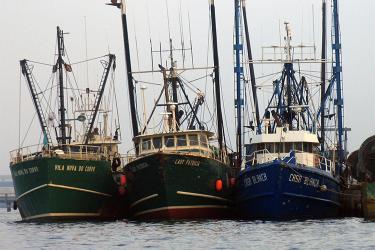In late January 2023, a peer review panel convened to examine our decision support tool, used to inform management options related to endangered North Atlantic right whales. The reviewers’ summary report is now available.
The tool is a software program that helps us understand the relative risk of North Atlantic right whale entanglement in fixed gear fisheries throughout U.S. Atlantic waters. It also allows us to evaluate entanglement risk reduction under different mitigation actions.
The Atlantic Large Whale Take Reduction Team first used the original version of the tool in April 2019. It considered the distribution and configuration of Northeast lobster and Jonah crab gear. It has since been updated. It now incorporates all fisheries regulated under the Atlantic Large Whale Take Reduction Plan along the entire East Coast, and includes additional data on right whale distributions.
The independent peer-review panel of non-NOAA scientists was recruited and selected by the Atlantic Scientific Review Group. The Atlantic Scientific Review Group advises NOAA Fisheries and the U.S. Fish and Wildlife Service on marine mammals along the Atlantic coast, Gulf Coast, and U.S. territories in the Caribbean.
NOAA Fisheries uses the best scientific information available when making management decisions. That can include developing new methods such as the decision support tool and using peer reviews to evaluate them. Researchers routinely test scientific ideas through peer review.
Panel Findings
In particular, the panel recommended various additions to the model inputs, structure, and outputs to improve how uncertainty is accounted for and communicated to stakeholders.
The summary review report also:
- Recognizes the tool was constructed to address the immediate management need for a risk assessment
- Concludes the peer review terms of reference were generally met
- Acknowledges the extensive efforts undertaken to describe the U.S. Atlantic fixed gear fisheries
- Identifies strengths and weaknesses of the tool
- Recommends various additions and modifications to the model
- Suggests that addressing some of the recommendations on modifying the tool should take precedence over further development to advance it
Next Steps
We will continue to address the reviewers’ recommendations, some of which can be done in the short term while others will take longer. Meanwhile, the tool is the best method we have for comparing possible management scenarios as we work to support North Atlantic right whale recovery and sustainable fishing.
The Atlantic Large Whale Take Reduction Team, NOAA Fisheries, and state collaborators use the tool as we develop recommendations for reducing the risk of North Atlantic right whale mortality and serious injuries by entanglement in gear used in East Coast fixed gear fisheries. Results obtained using the tool inform, but do not specify, management decisions. It does not tell users what the “best” solution is.
Recent federal legislation has extended the timeline for implementing further measures to reduce risks posed to North Atlantic right whales by lobster and Jonah crab gear into 2028. The tool remains useful to the Atlantic Large Whale Take Reduction Team and others working on large whale protection. It can be used both for interim gillnet rulemaking and for future rulemaking for the lobster and Jonah crab fishery.
We look forward to continuing our work with the Atlantic Large Whale Take Reduction Team, other stakeholders in the region, and Canada to continue to support both North Atlantic right whale recovery and sustainable fisheries.



